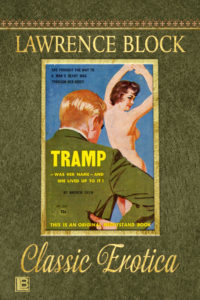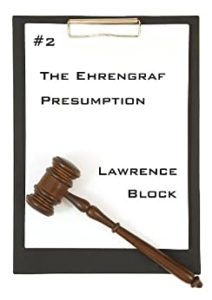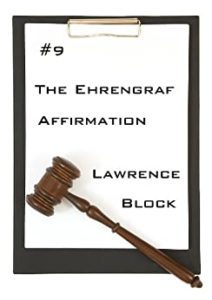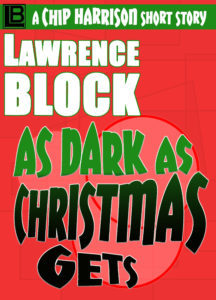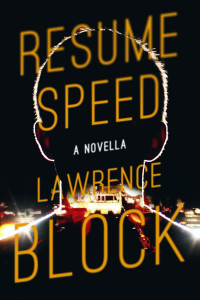Lawrence Block's Blog, page 3
June 24, 2022
A Burglar! A Book! A Birthday!
Well, Happy Birthday, young man! Have I got the date right? June 24?
That’s the date. Another solar return, as my astrologer would tell me.
I didn’t know you were into that.
I’m a writer. Part of the job description calls for a minimal surface knowledge of almost everything, a wealth of information that’s like the Pecos River, an inch deep and a mile wide. So I can tell you with authority that my Sun sign is Cancer on the Gemini cusp with Gemini rising, and that I have Moon in Taurus, Venus in Leo, and an ex-wife in Ashburn, Virginia. Just don’t ask me what any of that means.
I wouldn’t dream of it.
So yes, it’s my birthday. And birthdays have numbers, annoyingly enough, and this particular birthday is one I choose to designate as my Charing Cross Road birthday.
Why?
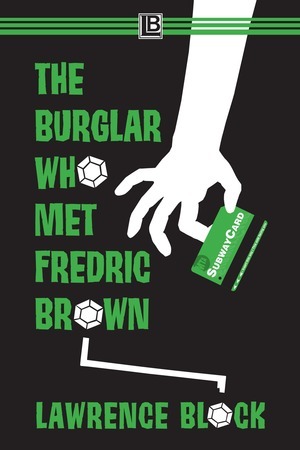 You’ll work it out. But the fact that today’s my birthday is by no means the most significant thing about it. Today’s the day you can preorder what I’m self-centered enough to regard as the publishing event of the year, The Burglar Who Met Fredric Brown.
You’ll work it out. But the fact that today’s my birthday is by no means the most significant thing about it. Today’s the day you can preorder what I’m self-centered enough to regard as the publishing event of the year, The Burglar Who Met Fredric Brown.
And that’s the cover? Hey, I like it!
What’s not to like? It’s by Jeff Wong, and a nice match for his covers for The Burglar Who Counted the Spoons and The Burglar in Short Order.
I can’t wait to read it.
You’ll only have to wait until October 18. And you don’t have to wait even a day to get your preorder in. Just click any of these preorder links and you’re on your way: Amazon Barnes & Noble Apple Kobo Thalia Vivlio
What does preordering get me?
Right now? My sincere and profound gratitude. Come 10/18, it gets you the book as well, and on the very day it’s released.
Does it save me any money?
Possibly. The preorder price is $9.99. If that should increase—always a possibility in these uncertain times—you’re locked in.
Just as important, it saves adding another item to your To-Do list—or trying to hold it in your memory. “Done and done,” you can say to yourself, while you go on to Other Things.
All I see here is the ebook. Won’t there be a paperback?
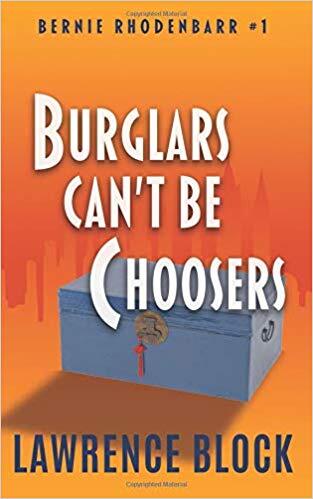 Indeed there will, with the same October 18 release date, but it takes a little longer to set paperbacks up for preorder. As soon as it’s ready, I’ll let y’all know. Meanwhile, why don’t you go ahead and preorder the ebook?
Indeed there will, with the same October 18 release date, but it takes a little longer to set paperbacks up for preorder. As soon as it’s ready, I’ll let y’all know. Meanwhile, why don’t you go ahead and preorder the ebook?
Okay, give me a minute. (click…click…click…) There! Done and done.
Wasn’t that easy?
And gratifying, I have to admit. And now I can go on to those Other Things, chief among them the adventure of reading my way through the entire Burglar series before the new one pops up in my In box. They’re all available, right? As ebooks and audiobooks and paperbacks?
They are.
I don’t suppose you’d care to list them in order, would you? With the dates of their first publication?
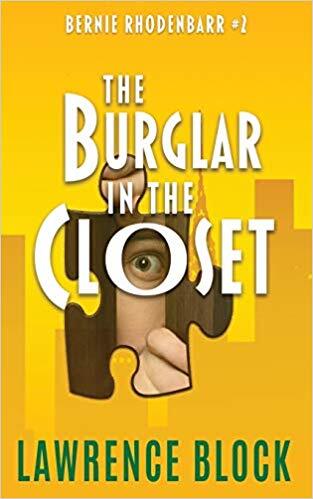 Sure, why not?
Sure, why not?
Burglars Can’t Be Choosers 1977
The Burglar in the Closet 1978
The Burglar Who Liked to Quote Kipling 1979
The Burglar Who Studied Spinoza 1980
The Burglar Who Painted Like Mondrian 1983
The Burglar Who Traded Ted Williams 1994
The Burglar WhoThought He Was Bogart 1995
The Burglar in the Library 1997
The Burglar in the Rye 1999
The Burglar on the Prowl 2004
The Burglar Who Counted the Spoons 2013
The Burglar in Short Order 2020
That’s quite a list. There were some gaps, weren’t there? Eleven years between Mondrian and Ted Williams. Nine years between Prowl and Spoons.
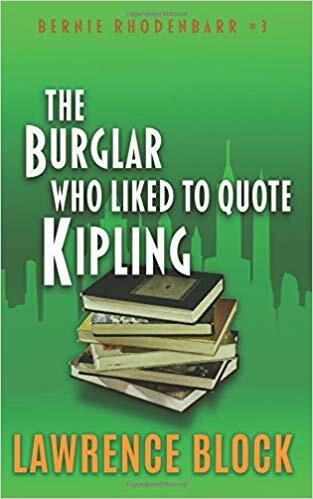 I kept thinking the series was over.
I kept thinking the series was over.
And you kept being wrong. I suppose the books are best read in order.
Well, I wrote them in order, but what choice did I have? It’s by no means a bad idea to read them in order, as an incident in one book is occasionally referenced in another, but it’s less important than with the Matthew Scudder books, where the character ages in real time and his life changes accordingly.
Bernie never ages, does he?
No, nor does he change much. He still does what he loves and loves what he does. You know, when the fourth book was published—
Spinoza?
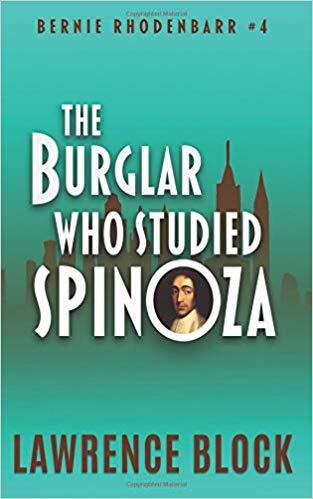 Right. I got a letter from a reader who said that was the last Bernie Rhodenbarr book he’d ever read, because after four books Bernie should have learned that burglary was immoral and indecent—
Right. I got a letter from a reader who said that was the last Bernie Rhodenbarr book he’d ever read, because after four books Bernie should have learned that burglary was immoral and indecent—
And fattening?
No doubt. Bernie, a presumably bright person, should have seen the error of his ways and reformed.
What was your response?
I never did answer that letter. But I didn’t throw it out, either. And then, in the early days of the pandemic lockdown, when the whole country had that inexplicable shortage of toilet paper—
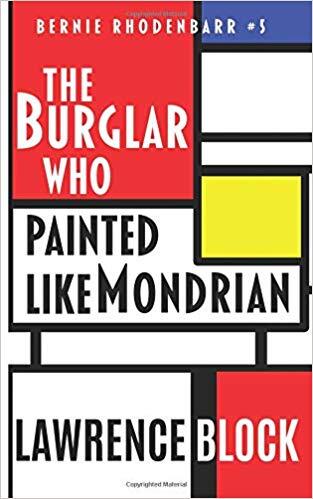 Say no more.
Say no more.
Fair enough. But no, Bernie doesn’t change much, and it’s by no means essential to read the books in order. In fact it’s occasionally seemed to me that a new reader might best begin with #3, The Burglar Who Liked to Quote Kipling, because that’s the first book in which Bernie’s leading the life he’ll maintain from then on, with Carolyn Kaiser as his best friend and Barnegat Books as his place of self-employment.
It took him a couple of books to find himself, eh?
Bernie was Bernie from the first chapter of Choosers. The personality was there from the very beginning. But it took until Kipling for him to settle into the life that would help to define him.
Well, we certainly know who he is. But I’m surprised he’s back in action. May I read something to you?
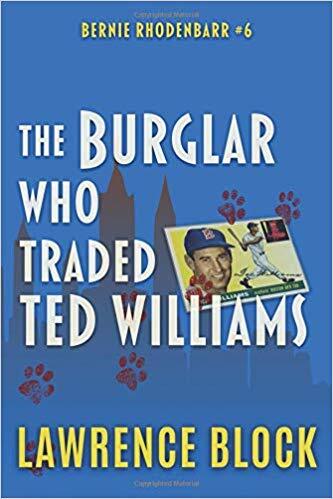 Um…
Um…
It won’t take long. “Barnegat Books was already an anachronism when I bought it. Still, people used to read. They used to collect first editions, and track down the complete works of writers they discovered. Now they zone out with Netflix, and what reading they do is on an eReader or an iPad. And if they’re old-fashioned enough to collect books, they don’t have to hunt for them. Why breathe in the dust of an old bookshop when you can find anything you could possibly want through a five-minute online search?”
That sounds familiar.
I’m not finished. “I had this other occupation, and I made enough at night to cover any losses I incurred day-to-day. But now that the entire planet’s wired for closed circuit TV, with security cameras everywhere you can imagine and some places you can’t, well, forget it. There’s no cash 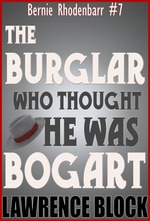 anywhere anyhow, and if you steal something nobody’s going to buy it from you, and being a burglar makes even less sense than being a bookseller. Two occupations, one legit and one not, and both of them rendered obsolete by encroaching technology.”
anywhere anyhow, and if you steal something nobody’s going to buy it from you, and being a burglar makes even less sense than being a bookseller. Two occupations, one legit and one not, and both of them rendered obsolete by encroaching technology.”
I think I know where that’s from.
And well you might. It’s in the last chapter of The Burglar in Short Order, and it lays out rather persuasively why we’ll no longer get to read about Bernie’s adventures.
Right.
Yet here he is again. Can you explain?
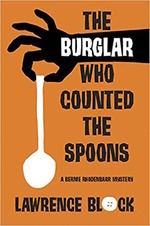 I don’t have to. You just preordered, right? Did you bother to read the book description on the preorder page?
I don’t have to. You just preordered, right? Did you bother to read the book description on the preorder page?
Um…
I didn’t think so. Go back to that page—here’s a link—and take a minute or two to read the book description.
And while you do, I’ll tell you how to fill up a shelf or two with signed first editions of mine for $10 apiece. A few years ago, I stopped retailing signed copies of my work, and sold my entire stock to my friend Otto Penzler, proprietor of the Mysterious Bookshop. And now, to celebrate my Charing Cross Road birthday—
I still don’t know why you’re calling it that.
—Otto’s running a limited-time special, with fifteen books of mine, originally priced as high as $75, for just ten dollars each. Order five books or more and the price drops to $7.50 a book.
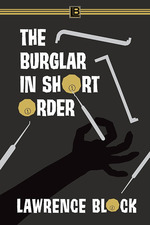 Wow.
Wow.
I know. Here, have a look.
That’s—
I know. And I think that’ll do it for now. While all of y’all preorder The Burglar Who Met Fredric Brown and stock up on bargains from Otto, I’ll be figuring out how to celebrate my birthday.
Your Charing Cross Road birthday. Oh!
Oh?
I just figured it out.
I knew you would, and you didn’t even have to Google it. Some would call it my Orwellian birthday, but I like it better this way. And it leads straight to another question: Why did the charing cross the road?
Cheers,

PS: As always, please feel free to forward this to anyone you think might find it of interest. And, if you yourself have received the newsletter from a friend and would like your own subscription, that’s easily arranged; an email to lawbloc@gmail.com with LB’s Newsletter in the subject line will get the job done.
LB’s Blog and Website
LB’s Facebook Page
Twitter: @LawrenceBlock
June 14, 2022
Shhh! Listen to the Burglar!
I suppose the burglar in question is Bernie Rhodenbarr, and you’ve got something to say about audiobooks.
It’s hard to sneak anything past you, isn’t it? Yes, the larcenous fellow is indeed Bernard Grimes Rhodenbarr, and the forthcoming work of which he’s the titular hero—
You just wanted to use that word, didn’t you?
—is The Burglar Who Met Fredric Brown. As most of y’all know, it’s the new full-length novel I’ll be bringing out in October in ebook and paperback, with a deluxe signed-and-limited hardcover to follow from Subterranean Press sometime in 2023.
And now I’m delighted to announce that those of you who read with your ears are in for a treat. Richard Ferrone, renowned as the Voice of Bernie Rhodenbarr, will be narrating the new title for Recorded Books.
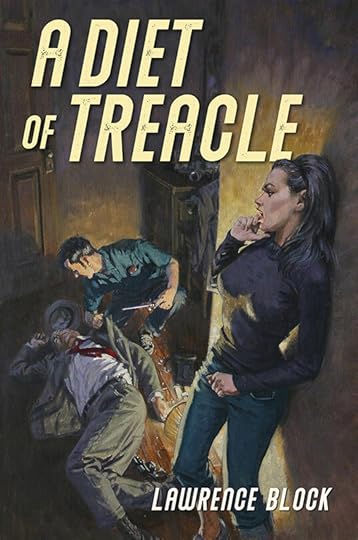 I’m really pleased to hear that. In anticipation of the new book, I’ve been listening to some of the early titles—and Richard’s narration is outstanding. You ought to list all the Burglar titles in order, and include links, and—what’s the matter? Am I getting out in front of my skis?
I’m really pleased to hear that. In anticipation of the new book, I’ve been listening to some of the early titles—and Richard’s narration is outstanding. You ought to list all the Burglar titles in order, and include links, and—what’s the matter? Am I getting out in front of my skis?
Kind of. In a week or so there’ll be a newsletter furnishing all of that and more, but I’ve got two other subjects to treat today, Subterranean Press and John Warren Wells.
Subterranean is one of the country’s foremost small-press publishers, and JWW was your pen name ages ago for your books on human behavior, and what are the two of them doing in the same sentence?
They’re waiting to be examined in turn. First Subterranean, where I’ve enjoyed an idyllic relationship for decades; just this month they’ve brought out limited editions of three crime novels of mine from the early 1960s, none of which has previously appeared in hardcover. All three began life as pseudonymous paperback originals and have since achieved respectability under the Hard Case Crime imprint.
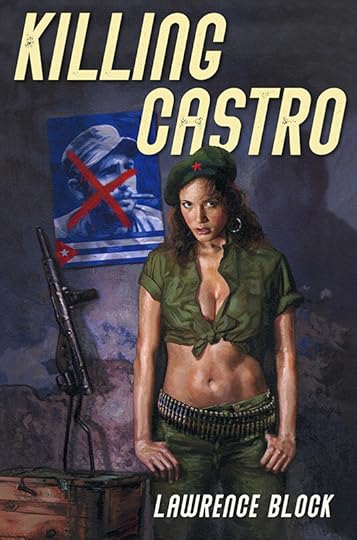 So these are the books’ first hardcover editions.
So these are the books’ first hardcover editions.
They are indeed. Here are the individual titles, each with an advance trade review of the new edition:
A Diet of Treacle (orig. Pads Are For Passion by Sheldon Lord, Beacon Books, 1961): “A potboiler morality play at its finest. It will give readers the delicious (and all-too-rare) feeling that anything could happen.” —Publishers Weekly
Killing Castro (orig. Fidel Castro Assassinated! by Lee Duncan, Monarch Books, 1961): “Hard Case Crime continues to resurrect early work by genre stalwart Lawrence Block and this one may be the most interesting find of all. Plenty of blood and bullets and, as always with Block, a fine feel for character.” —Booklist “Absorbing! An intense, taut thriller.” —Publishers Weekly
Lucky at Cards (orig. The Sex Shuffle by Sheldon Lord, Beacon Books, 1964): “Block unwinds his plot superbly. Along the way, there is all the teasing sexuality and tongue-in-cheek noir style that a pulp devotee craves. It’s a doozy.” —Booklist
 These are physically beautiful books, signed and numbered, and limited to 500 copies of each. Subterranean licensed the original Hard Case art, by Chuck Pyle (Treacle and Cards) and Sharif Tarabay (Castro) to admirable effect. If you’re a collector, these are the editions you want; they’re in stock now and ready to ship.
These are physically beautiful books, signed and numbered, and limited to 500 copies of each. Subterranean licensed the original Hard Case art, by Chuck Pyle (Treacle and Cards) and Sharif Tarabay (Castro) to admirable effect. If you’re a collector, these are the editions you want; they’re in stock now and ready to ship.
And they won’t be around forever. While you’re visiting Subterranean’s site, take a moment to search for Lawrence Block titles; they’ve issued quite a few over the years, attractive and well-made books one and all, and you’ll find most of them listed and illustrated. And, in almost every case, you’ll see that they’re long since sold out and destined to remain out of print until the end of time.
Maybe I ought to get my order in now.
I don’t want to tell you what to do, but what could it hurt? Of course not every reader collects, or wants to shell out fifty bucks for a book. If all you want is to read A Diet of Treacle or Killing Castro or Lucky at Cards—
Or all three of them.
Whatever. They’re all readily available as ebooks or Hard Case paperbacks, on pretty much all platforms.
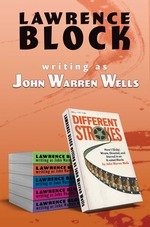 Let’s move on. John Warren Wells is the name I used for a long shelf’s worth of books on human sexual behavior published between 1968 and 1974. (The books are listed in Terry Zobeck’s bibliography of my work, A Trawl Among the Shelves, and I reminisce a bit about JWW and his precursors in Afterthoughts 2.0.) If you’d tried to tell me forty years ago that the day would come when I would not only own up to having written the books, but that I’d actually republish the little darlings, well, I’d have told you you were out of your mind.
Let’s move on. John Warren Wells is the name I used for a long shelf’s worth of books on human sexual behavior published between 1968 and 1974. (The books are listed in Terry Zobeck’s bibliography of my work, A Trawl Among the Shelves, and I reminisce a bit about JWW and his precursors in Afterthoughts 2.0.) If you’d tried to tell me forty years ago that the day would come when I would not only own up to having written the books, but that I’d actually republish the little darlings, well, I’d have told you you were out of your mind.
I guess it goes to show the power of Ego and Avarice.
No question that they’re the two horses that haul my chariot. The JWW books consist mostly of case histories illustrating facets of a common theme, often presented in interview form. They began as fiction in the guise of nonfiction, but a lot of the genuine article found its way into the books, as I entered into correspondence and occasional meetings with readers. And, with appropriate tweaks and name changes, I made use of the life experience of friends and acquaintances of mine—but that happens with fiction as well, doesn’t it?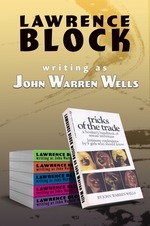
I don’t suppose the author’s own personal experience ever migrated into print, did it?
What a question. Let’s move right along, shall we? A few years ago I brought out most of the JWW canon as ebooks, and now my indispensable Design & Production genius has tricked them all out with new uniform cover art—and formatted them as well for paperback editions.
I hesitate to urge the JWW books upon y’all, but neither do I see any reason to hide their low-wattage light under a bushel. And just the other day an email arrived from Craig Childs, who had this to say:
“I am reading the last of your John Warren Wells backlist titles on Kindle this afternoon. My favorite of this series has been Different Strokes, but all of them have in some way showcased your ability to sketch vivid, believable characters through dialogue (even when some of those characters are busy doing some pretty  unbelievable things).”
unbelievable things).”
So. If you’re new to JWW’s world, you might want an introduction. Different Strokes, which Craig cites, is atypical—but very likely the most entertaining. Tricks of the Trade was the most successful, going into several paperback printings and, remarkably, a hardcover edition. And I always felt 3 is Not a Crowd came off reasonably well.
John Warren Wells, not content to shoulder his way onto people’s Kindles, is now taking up space on virtual paperback racks. Well, I suppose we should all be grateful that you’ve displayed at least a modicum of restraint. Because it could be worse.
Oh?
You could be bringing out JWW in audio. Hey, I’m just joking. I know you wouldn’t—oh, don’t tell me.
Just two titles. Don Sobczak narrates Wide Open: New Modes of Marriage, and Dolores McDougal and Bill Weeden team up for 3 is Not a Crowd.
Next you’ll be telling me there’s a John Warren Wells movie in the works.
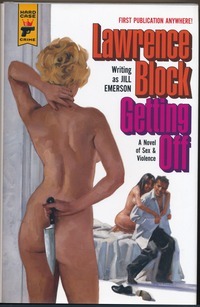 Now there’s an idea. Different Strokes was about the making of a movie which in fact was never made—but maybe its hour has come round at last.
Now there’s an idea. Different Strokes was about the making of a movie which in fact was never made—but maybe its hour has come round at last.
And maybe not. But that reminds me: Getting Off, my novel of sex and violence chronicling the sexy and violent Kit Tolliver, in under option to Travis Mills, the remarkably resourceful and energetic young filmmaker who recently succeeded in turning out a dozen feature-length Western films in a single year. Travis has completed a screenplay for Getting Off, and would be pleased to hear from potential investors and producers. If you think you might be a good fit in either of those categories, just email me at lawbloc@gmail.com, and my assistant David Trevor will forward your contact information to Travis.
And you know what? That’s all I got. I’ve just approved Jeff Wong‘s outstanding cover for The Burglar Who Met Fredric Brown, and I’d love to show it to y’all, but that’ll have to wait for a week or so. Next item on my To-Do List is setting up the new book for preorders, and as soon as I manage that, I’ll get back to you.
Cheers,

PS: As always, please feel free to forward this to anyone you think might find it of interest. And, if you yourself have received the newsletter from a friend and would like your own subscription, that’s easily arranged; an email to lawbloc@gmail.com with Newsletter in the subject line will get the job done.
LB’s Blog and Website
LB’s Facebook Page
Twitter: @LawrenceBlock
May 21, 2022
…AND THE BEST SHALL BE LAST
Ah, hello there! I’ve been out of touch with y’all for ages, and one happy result is that I have a lot to tell you. And, in the hope that you’ll read all the way to the end, I’m saving the best for last.
Isn’t that another way to say you’re burying the lede?
Oh, why put it that way? I always liked that phrase, “saving the best for last,” and often followed that policy at table, working my way through the broccoli before tucking into the brisket. Then one day at dinner my Uncle Jerry pointed out that, if you save the best for last, then you’re always eating the worst. I spent years thinking about that, and decided that, if you always eat the best first, then inevitably your meal becomes less enjoyable with every bite. I never had the chance to say as much to my uncle, and I’ve often wondered what he might have made of it.
 Is this the same Uncle Jerry who collected elephants?
Is this the same Uncle Jerry who collected elephants?
It is, and he’d be pleased that you remember. I wrote about Jerry’s elephant collection in the introduction to Collectibles, and posted that introduction on my website a year ago. But shall we move on?
By all means.
A few years ago—well, in 1957, actually—I wrote a parody of a Carter Family song about a train wreck, and my friend Dave Van Ronk recorded it as “Georgie and the IRT.” And now, all these years later, I had an inquiry from Dennis Krämer in Germany; would I allow him and his fellows to work up a German version?
Well, why not? And, through the miracle of YouTube, you can listen yourselves to “Schorsch und die KVB”—that being the subway system in Cologne, where the story is now set. From IRT to KVB; I can but wonder what DVR would make of it.
It does sound good to me, and it makes nice background music for some news of my ongoing program of bringing out my work in German and Italian translation. 2021 ended with the publication in German of Kellers Katastrophe (Hit and Run, translated by Sepp Leeb) and Der Einbrecher, der sich für Bogart hielt (The Burglar who Thought He Was Bogart, translated by Stefan Mommertz), while Luigi Garlaschelli’s Italian rendition of A Time to Scatter Stones emerged as Aspettando il Buio.
 And the beat goes on. Last month we brought out Stefan’s translation of The Burglar in the Closet—Der Einbrecher, der sich in Schrank versteckte; early this month saw the publication of Luigi’s Nel Vortice della Morte (Scudder #3, In the Midst of Death).
And the beat goes on. Last month we brought out Stefan’s translation of The Burglar in the Closet—Der Einbrecher, der sich in Schrank versteckte; early this month saw the publication of Luigi’s Nel Vortice della Morte (Scudder #3, In the Midst of Death).
I’d ask what’s next, but I figure you’ll tell me anyway.
You’ll have to wait until we get to the buried lede. But for those of you who’ve enjoyed Richard Heinrich’s German audio renditions, I’m delighted to report that he’s at work now on Sepp’s translation of Hit Man, Kellers Metier. He’s already voiced four of my books, Dead Girl Blues plus three Scudder novels, and he tells me he’s really enjoying Keller.
That’s all good and well. . .
I think you’ve got that backwards.
And why not? Your whole newsletter is backward. You’ve got some big news, something that’s even of interest to readers who can’t cope with German or Italian, and I really wish you’d let me know what it is.
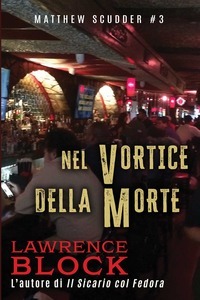 Oh, all right. I’ll just come right out and say it. I’ve written a new book.
Oh, all right. I’ll just come right out and say it. I’ve written a new book.
Gee, there’s a surprise. You’re a writer, and in your case the condition seems to be chronic. You keep coming out with books. You apparently can’t help yourself. When did you publish A Writer Prepares?
June of 2021, but it was a memoir. The book I just finished is a novel, and I honestly thought I was done writing novels.
Uh-huh. What sort of book was Dead Girl Blues?
A novel, but—
And when did you publish it?
June of 2020, but—
But what?
But I swear I thought I was done. I didn’t think I had the imagination or the drive or the stamina to add yet another novel to the groaning shelf.
That shelf’s not the only thing with reason to groan. Okay, I’ll pretend to believe you genuinely believed you were through, and I suspect I’m not the only person who’s glad you’ve proved yourself wrong. You want to tell us how it happened?
Let me take a stab at it. I don’t know if you remember, but back in the 1960s I wrote seven books about a fellow named Evan Tanner, and—
Oh, wow! I love the Tanner books! Don’t tell me you’ve written another? That’s the best news I’ve had in ages, possibly the very best news since you came out with an eighth Tanner novel in 1998, a full 28 years after #7. That really makes my day!
Well, time to unmake it. The new book is not about Tanner.
Then why did you—
Just hear me out, will you? Back in the late 1990s, when a publisher decided to reissue the Tanner books, I reread one or two in order to work up some promotional material. And I remembered how much I’d enjoyed writing about Tanner, and I thought it would be great to write another, but how could I? Tanner aged in real time, and he was a Korean War vet, he’d lost the ability to sleep as a result of a shrapnel wound, and I couldn’t get around the fact that he’d aged out of the kind of adventures that we might characterize as Tanneresque. I’d love to write more about him, I decided, but how could I plausibly make him the same age he was in Me Tanner, You Jane?
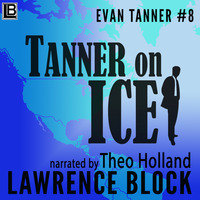 Then one night while I was at Lincoln Center, letting my mind wander while the New York Philharmonic played something stimulating, I saw a way to bring Tanner up to date without making him a day older.
Then one night while I was at Lincoln Center, letting my mind wander while the New York Philharmonic played something stimulating, I saw a way to bring Tanner up to date without making him a day older.
Once I had the idea, I couldn’t keep myself from writing the book.
And that turned out to be Tanner on Ice.
It did indeed. Tanner, whose political activities had unnerved the Swedish government, got himself drugged and flash-frozen—
And spent the next quarter-century in a frozen food locker in a sub-basement in Union City, New Jersey, if I recall correctly.
You do, and he did, and it was great fun. I set the book in Burma and wrote it in the Listowel Arms in Kerry, and if that wasn’t a genuine cross-cultural experience I’d be hard put to name one.
But the new book’s not about Tanner.
It’s not, but it’s also about a character I had every reason to think I was done with—and not because he’d aged out of the game. See, this fellow doesn’t age. He’s not discernibly older than he was when I started writing about him in 1977, although he’s been seasoned by a dozen books worth of experience.
The problem’s not that he’s changed, but that he’s unable to operate in today’s world.
OMG. 1977. A dozen books. Unable to operate in today’s world. That can only be Bernie Rhodenbarr!
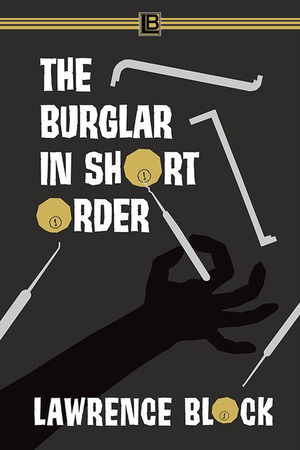 And that was the key point I made in the last chapter of The Burglar in Short Order. Bernie’s a burglar and a bookseller, and both of his occupations have been rendered obsolete. Security cameras and pickproof locks have done to burglary what eBay and Amazon have done to the retail book trade. There’s really no way for him to go on doing what he does, so how could I possibly go on writing about him?
And that was the key point I made in the last chapter of The Burglar in Short Order. Bernie’s a burglar and a bookseller, and both of his occupations have been rendered obsolete. Security cameras and pickproof locks have done to burglary what eBay and Amazon have done to the retail book trade. There’s really no way for him to go on doing what he does, so how could I possibly go on writing about him?
And then I got an idea.
At Lincoln Center? Listening to the Philharmonic?
I don’t recall the where or when of it, but it was a while ago when the idea began to form. I resisted it at first, and did what I’ve learned to do when an idea comes along. I told my subconscious mind “Thanks for sharing,” and I found other things to think about.
Nevertheless, it persisted. And, early this month, I completed The Burglar Who Met Fredric Brown.
That’s the title?
Is there something wrong with it?
Not as far as I’m concerned. I love Fredric Brown. But he died in 1972, so how could Bernie meet him? Oh, I bet I know how you managed it. It’s a time-travel story, isn’t it?
No, it’s not.
But it would have to be. Either Bernie goes back in time, or Brown comes forward in time, or—
No time travel, not for either of them or anybody else. If you want to know more, you’ll have to read the book.
Well, sure. I’d do that anyway, and I can’t wait. What do I have to do to get my hands on it?
All you have to do is be patient, and you don’t even have to do that for very long. I’ll be publishing ebook and trade paperback editions of The Burglar Who Met Fredric Brown in October, and I’ll be opening it up for preorders on June 24.
No hardcover?
Sometime next summer, Subterranean Press will publish a deluxe signed-and-numbered Limited Edition—and, for a very small number of y’all, an ultra-deluxe Lettered Edition. Those will be the book’s first hardcover editions.
This is very exciting news, and I have to admit the lede didn’t lose anything for having been buried. I’m almost afraid to ask, but is this only the beginning? Will there be more books about Bernie?
Haven’t you figure out yet that I never know what I’m going to do next? And why don’t you see if you like this one before you start lobbying for another?
I guess I get carried away. I remember how much I liked Tanner on Ice, and hungered for more. And you told me Tanner had the life cycle of a cicada, and that all I had to do was wait another 28 years. 1970, 1998—hey, you know what? In four more years it’ll be 2026!
I’ll pretend I didn’t hear that.
And I’ll pretend I didn’t say it. A new Bernie Rhodenbarr novel! And all I have to do is wait for October, and I think I’ll pass the time by rereading all the Burglar books, starting with Burglars Can’t Be Choosers, and then I’ll reread all the Tanner books, starting with The Thief Who Couldn’t Sleep. How does that sound?
Like a plan, and a good note to leave on.
Cheers,

March 20, 2022
See the Book! Read the Movie!
Oh, there you are, LB. Still got a pulse, eh? Still capable of sitting up and taking nourishment?
Sarcasm is so easy, isn’t it? And perhaps justified, as I have in fact been silent for a month or two…
Or three.
…but I’ve been busy.
With things you won’t talk about.
 Not just yet, no. But something else inspires me to break my long silence. A few days ago, Netflix decided to Spring Forward by offering its subscribers A Walk Among the Tombstones, the 2014 film written and directed by Scott Frank and starring Liam Neeson. And I’m evidently not the only one to find this cause for rejoicing. In no time at all AWATT was the streaming service’s #10 title, and the last I heard it had moved up into second place.
Not just yet, no. But something else inspires me to break my long silence. A few days ago, Netflix decided to Spring Forward by offering its subscribers A Walk Among the Tombstones, the 2014 film written and directed by Scott Frank and starring Liam Neeson. And I’m evidently not the only one to find this cause for rejoicing. In no time at all AWATT was the streaming service’s #10 title, and the last I heard it had moved up into second place.
The film’s pulling in a whole lot of new eyeballs, as one might say, and it’s also generating a good deal of chatter, online and elsewhere. Seven years after its release, the movie’s drawing the enthusiastic reviews that it didn’t get back in the day.
I’m not surprised. What did surprise me, back in 2014, was how utterly A Walk Among the Tombstones failed to find its audience. I saw the film before its release, and I thought it was a clear winner. Liam Neeson had been at the top of my Scudder wish list ever since I saw him in Michael Collins, and his performance was pitch-perfect, his screen presence magnetic. Scott Frank’s script was taut and solid, and the cinematography (Mihai Malaimare Jr.) and the score (Carlos Rafael Rivera) were both impeccable. With all that going for it, why shouldn’t the movie get raves from the critics and sell a ton of tickets?
One word: Taken.
In 2008, the film with that title made Liam Neeson an action-adventure star, and was successful enough to launch two sequels imaginatively entitled, with the imagination and ingenuity for which the industry is justly renowned, Taken 2 and Taken 3. They were, as they say, excellent examples of what they were, and they put a lot of bottoms in a lot of seats.
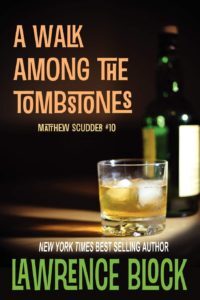 And they took all the air out of A Walk Among the Tombstones. Because, unlike the Taken films, it never set out to be a pulse-pounding action thriller. It was thoughtful and measured and character-driven, very much the sort of film adaptation a Matthew Scudder novel ought to inspire.
And they took all the air out of A Walk Among the Tombstones. Because, unlike the Taken films, it never set out to be a pulse-pounding action thriller. It was thoughtful and measured and character-driven, very much the sort of film adaptation a Matthew Scudder novel ought to inspire.
So the Taken fans found it lacking, and told their friends to give it a pass. And AWATT’s ideal audience never bought tickets in the first place, expecting another Taken installment under another name.
And the critics were no help.
Never mind. The picture’s finding its audience, and it’s the late-in-life hit it should have been seven years ago.
And you’re raking in the bucks, right?
Um, that’s not how it works. I got paid when they made the film, and I’d have earned some bonus money if it had been a major hit, but it wasn’t, and its new life on Netflix won’t put any money in my pockets. But, you know, that’s okay. I’m not walking around with empty pockets. And this way my motive for urging you to see the movie is not ulterior but altruistic.
So—if you’re a Netflix subscriber, and if you haven’t seen A Walk Among the Tombstones, I would urge you to do so. If you saw it some years ago, I’d advise you to see it again. There’s a lot to like about the picture, not least of all the way Liam Neeson contrives to embody the character of Matthew Scudder.
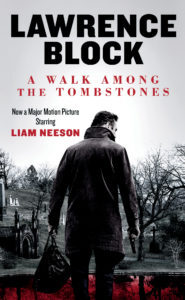 And, whether or not you watch the movie, I’ll urge you to read the novel. I admire the film greatly, for all the reasons I’ve cited, but it’s not perfect. There are ways in which the book is superior.
And, whether or not you watch the movie, I’ll urge you to read the novel. I admire the film greatly, for all the reasons I’ve cited, but it’s not perfect. There are ways in which the book is superior.
For one, the story’s better. It’s easier, after all, for a novel to have a better storyline than its film adaptation. If a book’s rich in incident and texture, it’s going to lose something in translation. And, when the timespan between film option and theatrical release is fifteen years, the erosion can be considerable.
Elaine Mardell, Scudder’s girlfriend, plays a major role in the novel; she doesn’t exist in the film. A surviving victim of the killers provides a key lead; she’s omitted altogether. A dismally trite plot device—Scudder’s case butting up against some unrelated drug investigation—is pressed into service. TJ, while played well enough by the rapper Astro, has way more dimension in the book. And the film’s ending is at once hoked up and less powerful.
I can see you really loved it.
It’s a good movie. But it would have been a better one if the script had tracked closer to the book. I know Scott told me he regretted having lost Elaine; I think if he’d made AWATT later than he did, after Godless and The Queen’s Gambit, he might have made a few different choices, ones that to my mind would have served the film better.
Never mind. If you have access to Netflix, see the movie—sooner rather than later, as I don’t know how long they’ll be making it available. If you don’t have Netflix access, you can hunt for it elsewhere; it’s shown up from time to time on premium cable, and I’ve no idea where else you may be able to find it.
And read the book. It’s not hard to find.
Cheers,
January 18, 2022
A Brief Matthew Scudder Q&A
David Trevor here. We haven’t sent out a newsletter, or done much of anything, in ages. LB is working on something, or says he is. He won’t say what, but that’s typical. Also says he’s got no time for newsletters or social media or blogging or anything that might take him away from his divinely inspired mission of Being A Writer.
Which is his prerogative, as he’s quick to tell me. But he did make time to answer a handful of questions from one of his translators, which struck me as an odd thing to prioritize, and then he posted the mini-interview on Facebook, where people wore out their fingers pressing the Like button, and posted a lot of comments as well. But somehow the Great Man never did get around to sharing it on Twitter, or anywhere else.
I told him we pay the same monthly fee to Mailchimp whether we send out a newsletter or not, and that when you’re as old as he is you ought to make a point of communicating often enough so that people will know you still have a pulse. So could I send it out as a newsletter? He told me to knock myself out, which I’m interpreting as giving me the green light.
So here it is:
My brilliant Italian translator Luigi Garlaschelli, whose most recent work is A Time to Scatter Stones (that’s Aspettando il Buio in Italian) sent me a four-question interview for a page he’s set up, and I thought English-speaking readers might find it of interest:
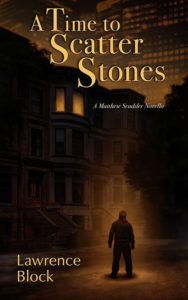 1) What prompted you to write one more novella about Scudder, where he and Elaine are represented as an elderly couple?
1) What prompted you to write one more novella about Scudder, where he and Elaine are represented as an elderly couple?
I was thinking about the two of them, as one does, and what their lives would be like, and what sort of episode they might be involved in. And ideas came, and one day I set out to explore one of them. I went away to another city, secluded myself in a house I rented for the occasion, and began writing. It went well for a while, and then it didn’t, and I gave up and turned to something else, a novella about another series character, the hit man Keller. That too went well for a while, and then it didn’t, and I said the hell with it and came home.
But for a writer, Luigi, it can be argued that nothing is wasted. After I’d been home for a few months I looked at what I’d written about Keller and realized that I could make it work, and I put in some more work on it, and published it as Keller’s Fedora. And more time passed, and I looked at what I’d written about Scudder, and rewrote it substantially and saw it through to the end—and that became A Time to Scatter Stones.
2) Why does Scudder age in real time (or almost) whereas other characters (e.g. Bernie) don’t ?
I think it’s a question of realism. The Scudder books and stories are realistic in a way (or to an extent) that the Burglar and Keller stories are not. Most characters in crime fiction—and especially in detective stories—stay essentially the same. They don’t age or change perceptibly. And that’s fine, because in series fiction the reader generally wants the same thing over and over; they enjoyed it once, and want more of it. It’s easier for all concerned if change is kept to a minimum.
But when I wrote about Scudder, I realized fairly early on that what he experienced in one book could not fail to influence him in the future, that he had to age and change in response to the events in his life. I was never specific about his age until I wrote A Long Line of Dead Men, which is more than anything else a novel about aging and mortality and the passage of time. To be other than specific about his age in such a book would be an evasion, so I worked things out and decided that he was more or less the same age as I am. (This made it easy to keep track of his age in subsequent books!)
Allowing him to age has limited the adventures he can have. I myself am 83, and just getting out of bed in the morning is adventure enough for me. So Scudder is well past the age of leaping tall buildings in a single bound. But I’m glad I did it the way I did. If I hadn’t allowed the man to age and change, I suspect I’d have stopped writing about him quite a few years ago.
3) This novella might look both sad (Scudder is now old and tired) and reassuring (he’s old, but he’s always got what it takes). Which point of view did you want to be the main one?
I didn’t really think in those terms. I just tried to get it right.
4) Without spoiling the plot, we can say that there is an unexpected (or unusual) erotic twist. Was there a specific reason for this – for you as the author?
You know, it’s usually profitless to ask me why I made a particular choice in fiction. I’m far more an intuitive than an intellectual writer, and all I do is take the story down the path that feels right to me. When characters come alive for me, I let them do what they seem inclined to do. I won’t babble about the characters taking over, I’m the one who’s in charge here, but I’m happiest when I’m able to keep a very light hand on the reins.
And, all in all, it’s a pretty hot scene, isn’t it?
* * *
And that’s that. If he’s actually working on something, and if he finishes it, no question I’ll let you know about it. Meanwhile, I think the least I can do is forge his typographic signature:
Cheers,

November 22, 2021
CAMPUS TRAMP—she’s not just ink & pixels!
If only. No, the book’s heroine, Linda Shepard, has always been the product of a 21-year-old’s overactive imagination. The book she starred in, Campus Tramp, was my first novel for Nightstand Books and marked the debut of Andrew Shaw. It became a cult classic at Antioch College, if nowhere else in the world, and brought a high price at senior sales in Yellow Springs until the era of self-publishing allowed me to make it available in ebook and paperback form.
But now—well, see for yourself:
Now it’s a T-shirt.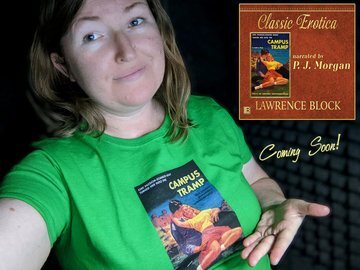
And a fine-looking one at that. Harold W. McCauley was Nightstand’s go-to cover guy in their early years, and his art brightens many of Andrew Shaw’s covers; always excellent, he really brought his A-game to Campus Tramp. And either he or his art director must have been familiar with Antioch College, because he painted a surprisingly accurate rendition of the college’s Main Building.
If I hadn’t decided to reserve the adjective for examples of Greek and Russian religious art, I’d call the cover iconic.
So it’s a great T-shirt, and P.J. Morgan really rocks it—just as she rocks the long-awaited audiobook of Campus Tramp.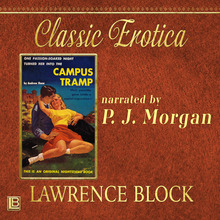
Really? Campus Tramp’s available in audio?
It is, and it’s outstanding. That’s no great surprise, as this is the fourth book of mine voiced by P.J.
The others are—?
Two Jill Emerson titles, Shadows and A Madwoman’s Diary, and Passport to Peril, by Anne Campbell Clarke.
Wasn’t Shadows first published under a different name? Lesley Evans, IIRC? You know what that means, don’t you?
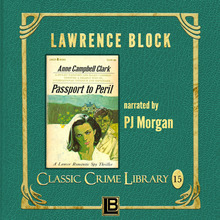 No, but I have a feeling you’ll tell me.
No, but I have a feeling you’ll tell me.
She’s been all your female pen names. Wait, there was another, wasn’t there? You republished it in the Collection of Classic Erotica, although I don’t know that it’s classic, or particularly erotic. “I Sell Love,” that’s the title, but I disremember who wrote it.
Um, I wrote it.
I meant—
I know what you meant. The pen name was Liz Crowley.
Well, I think you ought to get P.J. to narrate it.
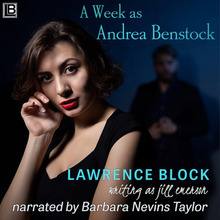 I’m not sure it’s good enough to merit such treatment.
I’m not sure it’s good enough to merit such treatment.
So? That’s never stopped you in the past.
Oh? Let’s move on, shall we? And we’ll keep the focus on audio for a paragraph or two. In the last newsletter, you’ll recall, I was delighted to let y’all know about Barbara Nevins Taylor’s splendid interpretation of A Week as Andrea Benstock. It’s moving nicely and picking up strong reviews, and I love when that happens.
Meanwhile, Theo Holland’s audiobooks of my Evan Tanner adventures have gone on finding their way into the hearts and minds—and ears!—of an ever-increasing audience. Now he’s getting some official recognition, and 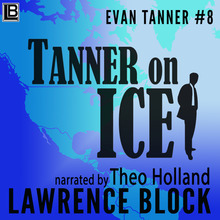 it’s about time. The eighth and final Tanner novel, Tanner on Ice, was shortlisted for Audio Thriller of the Year for the Audiobook Adrenaline Awards.
it’s about time. The eighth and final Tanner novel, Tanner on Ice, was shortlisted for Audio Thriller of the Year for the Audiobook Adrenaline Awards.
Is that a big deal?
I’d say so. Remember, I teamed up with Theo—as I’ve done with P.J. and Barbara and a batch of talented voice artists—to self-publish the audiobooks through Audible’s ACX division. It’s a marvelous opportunity for all concerned, but we can’t kid ourselves that we’re on an equal footing in the marketplace with major audio publishers like Recorded Books and Tantor. So when a self-published audiobook gets shortlisted for a prestigious award—yeah, I’d say it’s a big deal.
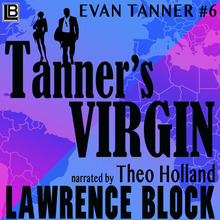 And it’s the final Tanner novel? Wait a minute, I remember the book. You wrote seven books about Tanner between 1966 and 1970, and in 1998 he returned in Tanner on Ice. He came back after 28 years!
And it’s the final Tanner novel? Wait a minute, I remember the book. You wrote seven books about Tanner between 1966 and 1970, and in 1998 he returned in Tanner on Ice. He came back after 28 years!
I know. The man has the life cycle of a cicada.
That would make him due for a reappearance sometime in 2026. I can hardly wait!
Well, don’t hold your breath—or go without sleep. I have to say, though, that I suspect my future publications will be limited to ones that require no new writing on my part. Playing Games, an anthology to be published by 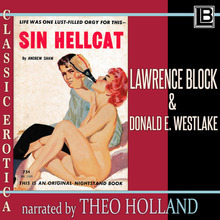 Subterranean Press as a deluxe limited hardcover (and by Your Humble Anthologist as an ebook and paperback) is wrapping up nicely, with all the stories in hand and an artist at work on the cover. I’m proud to bring you new stories from Patricia Abbott, Charles Ardai, S.A. Cosby, Jeffery Deaver, Tod Goldberg, Jane Hamilton, James D.F. Hannah, Gar Anthony Haywood, Elaine Kagan, Avri Klemer, Joe R. Lansdale, Warren Moore, David Morrell, Kevin Quigley, and Wallace Stroby. And I’m also reprinting stories by two writers who are no longer inclined to sit down and write something new.
Subterranean Press as a deluxe limited hardcover (and by Your Humble Anthologist as an ebook and paperback) is wrapping up nicely, with all the stories in hand and an artist at work on the cover. I’m proud to bring you new stories from Patricia Abbott, Charles Ardai, S.A. Cosby, Jeffery Deaver, Tod Goldberg, Jane Hamilton, James D.F. Hannah, Gar Anthony Haywood, Elaine Kagan, Avri Klemer, Joe R. Lansdale, Warren Moore, David Morrell, Kevin Quigley, and Wallace Stroby. And I’m also reprinting stories by two writers who are no longer inclined to sit down and write something new.
I’ve a feeling you’re one of them. Who’s the other?
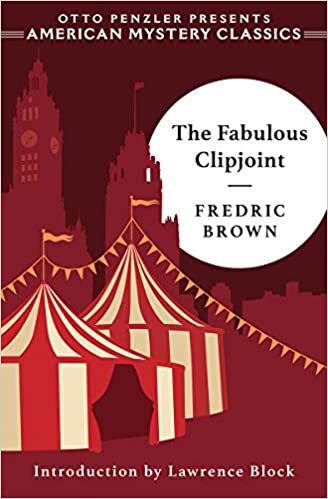 The illustrious Robert Silverberg, with a haunting story about turtle races and precognition.
The illustrious Robert Silverberg, with a haunting story about turtle races and precognition.
A natural combination. It’s nice the way you find ways to avoid writing anything. But you’ll have to provide an introduction, won’t you?
Don’t remind me. It’s in the works. But everything I try to write takes longer and uses up more energy than it used to. I noticed that in full measure writing an introduction for Otto Penzler’s American Mystery Classics edition of The Fabulous Clipjoint, Fredric Brown’s Edgar-winning first novel. It’s a book I’ve read several times over the years, and a few years ago I could have knocked out a solid intro in a couple of hours, and this time around it took three days. I guess it turned out all right; “As a tasty bonus,” Bill Ott wrote in Booklist, “this delicious reissue includes a charmingly anecdotal introduction by the inimitable Lawrence Block.”
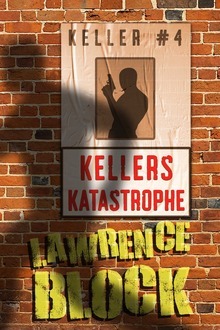 Inimitable, eh?
Inimitable, eh?
Oui, c’est moi. And yet another way in which I can go on publishing without writing anything is by teaming up with translators and self-publishing books in translation.
Sort of like what you’ve been doing in audio with ACX.
Sort of. Due to the efforts of Stefan Mommertz and Sepp Leeb, my entire Matt Scudder series is now available in German in both ebook and paperback form, as are a growing number of books in the Keller and Bernie Rhodenbarr series. The latest Keller novel is Sepp’s Kellers Katastrophe (Hit and Run), while Bernie’s represented by Stefan’s Der Einbrecher, der sich für Bogart hielt (The Burglar who Thought he was Bogart).
 Meanwhile, Luigi Garlaschelli has been doing his damnedest to make me a household name in Italy; Un Campo di Fiori Morti (All the Flowers Are Dying) has been well received, and he’s just delivered Aspettando il Buio (A Time to Scatter Stones); it’s in the pipeline now, and should be widely available within the next couple of weeks.
Meanwhile, Luigi Garlaschelli has been doing his damnedest to make me a household name in Italy; Un Campo di Fiori Morti (All the Flowers Are Dying) has been well received, and he’s just delivered Aspettando il Buio (A Time to Scatter Stones); it’s in the pipeline now, and should be widely available within the next couple of weeks.
All of the German and Italian translations are readily available on all the Amazon sites, and on most other online platforms as well. The best way to find them quickly is to enter “Lawrence Block Sepp Leeb” (or, duh, “Lawrence Block Stefan Mommertz” or “Lawrence Block Luigi Garlaschelli”) into the online bookseller’s search bar.
And that’s it. It’s my pleasure to wish all of y’all a Happy Thanksgiving—and, given the ever-widening temporal gap between newsletters, I might as well extend wishes for a Merry Christmas, a Happy New Year, a Gleeful Purim, and an Ecologically Meaningful Arbor Day.
Cheers,

PS: As always, please feel free to forward this to anyone you think might find it of interest. And, if you yourself have received the newsletter from a friend and would like your own subscription, that’s easily arranged; an email to lawbloc@gmail.com with Newsletter in the subject line will get the job done.
LB’s Blog and Website
LB’s Facebook Page
Twitter: @LawrenceBlock
October 13, 2021
So tell us, LB—what color is the moon?
So tell us, LB—what color is the moon?
What kind of question is that?
Rhetorical, because I already know the answer. It has to be blue, because there’s a newsletter from you in my inbox, and how often does that happen?
It’s been a while, hasn’t it? I could dodge your original question with one of my own: “What color was the bear?” But I’ll save that question and all that goes with it for the end of this epistle.
I can hardly wait. But, you know, given that I’ve already waited this long…
Right.
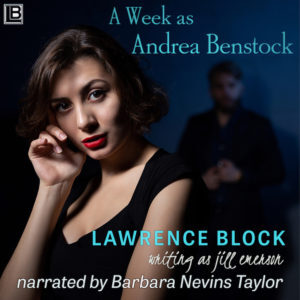 So shall we get to it? I’ll lead with the bit of news that pleases me the most, and that’s that Jill Emerson’s strongest novel, A Week as Andrea Benstock, is now available as an audiobook, brought brilliantly to life by Barbara Nevins Taylor. The book was published in hardcover by Arbor House in 1975, and was serialized in Redbook, and I’ve described the novel’s origins in detail on its Amazon page. It’s a very personal book, set in my hometown of Buffalo, and I suppose it’s a period piece now, given that almost half a century has come and gone since I wrote it, but I hope you’ll find that it holds up as a piece of mainstream literary fiction.
So shall we get to it? I’ll lead with the bit of news that pleases me the most, and that’s that Jill Emerson’s strongest novel, A Week as Andrea Benstock, is now available as an audiobook, brought brilliantly to life by Barbara Nevins Taylor. The book was published in hardcover by Arbor House in 1975, and was serialized in Redbook, and I’ve described the novel’s origins in detail on its Amazon page. It’s a very personal book, set in my hometown of Buffalo, and I suppose it’s a period piece now, given that almost half a century has come and gone since I wrote it, but I hope you’ll find that it holds up as a piece of mainstream literary fiction.
Barbara felt it did, and voiced it superbly. She’d already narrated two earlier novels of mine, A Woman Must Love and Of Shame and Joy, so my expectations were already high, but she’s exceeded them.
And if you’re deaf to the pleasures of audiobooks, you can still make Andrea’s acquaintance and spend seven enlightening days with her. Her story’s readily available as an ebook, paperback, and hardcover.
So after all these months, your lead item’s a novel you wrote under a pen name 46 years ago.
Well, I haven’t been doing much lately. A Writer Prepares got a good reception when it came out in June, and Dead Girl Blues, published in June of 2020, continues to sell briskly and pick up heartening reviews.
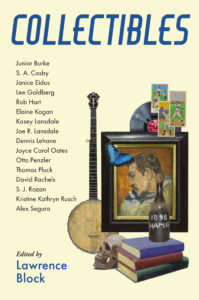 And readers and critics alike seem happy with Collectibles, my new anthology published in May. As per Omar, I’ll take the cash and let the credit go—to the authors of the individual stories. My chief contribution was the whimsical introduction, which you can read for free right here.
And readers and critics alike seem happy with Collectibles, my new anthology published in May. As per Omar, I’ll take the cash and let the credit go—to the authors of the individual stories. My chief contribution was the whimsical introduction, which you can read for free right here.
Didn’t I read somewhere that Collectibles will be your final anthology?
I don’t remember saying so, but I had pretty much decided I’d spent enough of my dotage as an anthologist. The pursuit does lend itself to the Golden Years, one gets to pose as a writer without having to write anything, but it’s a surprising amount of work for a surprisingly small return, and I figured I was done. And Collectibles was a strong book to go out on.
But you’re not done, are you?
Alas, I’m not. What happened was what all too often happens—I got an Idea.
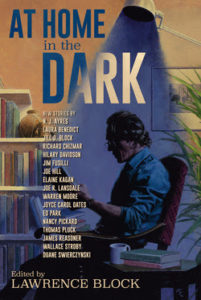 A lightbulb materialized overhead?
A lightbulb materialized overhead?
Just so. Now when I get an idea for a short story or novel, it’s rarely a problem. Usually I let it percolate, and it doesn’t, and that’s that. But if it’s a really good and persistent idea, I actually spend a few days, sometimes a couple of weeks, writing words and sentences and paragraphs, even whole pages. And then I stop, and start again only to stop again, until one day it becomes clear that it’s not going anywhere, ever, and I’m able to abandon it.
That sounds so sad.
Ah, but the final five words of the paragraph make up a happy ending, don’t they? “I’m able to abandon it”—and thence return to a blissful state of inactivity. Never mind. With an anthology it’s different, because the first flush of enthusiasm leads me to propose the idea to a publisher like Bill Schafer at Subterranean Press, who’ll get on board for a signed limited edition, and then I set about recruiting writers do the actual work.
And so on.
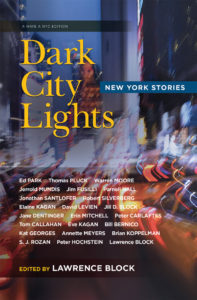 And then, by the time I realize that the world could get along fine without this book, and that I don’t want to go through all the work required for putting it together and publishing it, well, see, it’s too late. I’ve got other people signed up, working on stories (or not working on stories and secretly hoping the project gets aborted, but never mind). I’ve got a Contract with a Small-Press Publisher. I’ve got Other People all over the place, and they’ve got Expectations, and it’s up to me to Fulfill them. “I’m stuck this time,” I tell myself, “but once this is done I’ll never do it again.”
And then, by the time I realize that the world could get along fine without this book, and that I don’t want to go through all the work required for putting it together and publishing it, well, see, it’s too late. I’ve got other people signed up, working on stories (or not working on stories and secretly hoping the project gets aborted, but never mind). I’ve got a Contract with a Small-Press Publisher. I’ve got Other People all over the place, and they’ve got Expectations, and it’s up to me to Fulfill them. “I’m stuck this time,” I tell myself, “but once this is done I’ll never do it again.”
Yet here you are, doing it again.
Indeed, with a book called Playing Games. At the moment I’ve got sixteen stories in hand, and one more’s gonna land in my inbox in a matter of days, and we’ll be good to go. And of course they’re outstanding stories, because that’s what you tend to get from outstanding writers.
Care to name names?
Not just yet, but for now I can tell you that each story involves a game, and here they are: Hide & Seek, Pac-Man, Handball, Checkers, Candyland, Dungeons & Dragons, Psychiatrist, Mousetrap, Mahjong, Crokinole, Marbles, Jigsaw Puzzles, Bar Trivia, Boggle, Russian Roulette, and Gin Rummy.
All salutary ways of passing the time when you’re not writing anything.
Russian Roulette? Salutary?
Well, maybe not. And this will be your final anthology…but we’ve heard that song before, haven’t we? Just how many have you of these hodgepodges have you perpetrated, anyway?
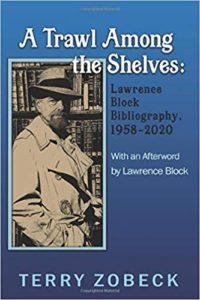 Terry Zobeck lists seventeen in A Trawl Among the Shelves, and that doesn’t include Collectibles, so I guess Playing Games will be #19 when Subterranean publishes their limited edition sometime next year. Of course not all of them are in print or eVailable. Here’s a list in chronological order, with links to the ones that are: Death Cruise, Master’s Choice, Opening Shots, Master’s Choice 2, Speaking of Lust, Opening Shots 2, Speaking of Greed, Blood on Their Hands, Gangsters Swindlers Killers & Thieves, Manhattan Noir, Manhattan Noir 2, Dark City Lights, In Sunlight or in Shadow, Alive in Shape and Color, At Home in the Dark, From Sea to Stormy Sea, The Darkling Halls of Ivy, Collectibles.
Terry Zobeck lists seventeen in A Trawl Among the Shelves, and that doesn’t include Collectibles, so I guess Playing Games will be #19 when Subterranean publishes their limited edition sometime next year. Of course not all of them are in print or eVailable. Here’s a list in chronological order, with links to the ones that are: Death Cruise, Master’s Choice, Opening Shots, Master’s Choice 2, Speaking of Lust, Opening Shots 2, Speaking of Greed, Blood on Their Hands, Gangsters Swindlers Killers & Thieves, Manhattan Noir, Manhattan Noir 2, Dark City Lights, In Sunlight or in Shadow, Alive in Shape and Color, At Home in the Dark, From Sea to Stormy Sea, The Darkling Halls of Ivy, Collectibles.
What else is there? A young Uzbek filmmaker, Mahmudov Shohruh, has completed a short film based on my short story, “When This Man Dies,” with two versions, one with an English soundtrack, the other with English subtitles; it’s not yet available for viewing, but I’ll let you know when it is. I’ve got voice artists at work on a couple of audiobooks, and translators wrapping up Italian and German editions of works of mine. (To see what’s available from Amazon or another online bookseller, search for “Lawrence Block Sepp Leeb” or “Lawrence Block Stefan Mommertz” [German] or “Lawrence Block Luigi Garlaschelli” [Italian]; for German audiobooks, search for “Lawrence Block Richard Heinrich.”)
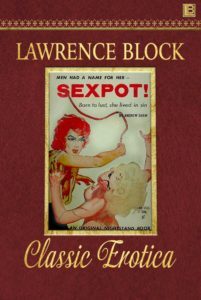 And Ego and Avarice have led me to continue bringing out early Andrew Shaw titles in my Collection of Classic Erotica. Most of these are enrolled in Kindle Unlimited, so that members can read them for free. And even if you don’t have KU access, all you need is an internet connection to read my mini-essays specially written for each book’s Amazon product page.
And Ego and Avarice have led me to continue bringing out early Andrew Shaw titles in my Collection of Classic Erotica. Most of these are enrolled in Kindle Unlimited, so that members can read them for free. And even if you don’t have KU access, all you need is an internet connection to read my mini-essays specially written for each book’s Amazon product page.
Sometimes they’re better than the books.
And shorter, too. And entirely my own work, which is more than I can say for Sin Master, which I discovered to be the work of some nameless ghostwriter. I kept a few ghosts busy writing Andrew Shaw novels, and one reason I’ve been republishing my own titles is to separate my own chaff from the chaff produced by others. (Another is that those covers,most of them by Harold W. McCauley, deserve another season in the sun.)
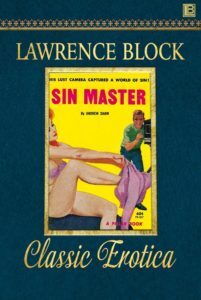 Here are the newly published titles, volumes 25 to 37 in the collection: Flesh Mob, Flesh Parade, Girls on the Prowl, Lust Weekend, Passion Nightmare, Sexpot, Sin Bum, Trailer Trollop, The Wife-Swappers, The Sin-Damned, Man For Rent, Butch, and Sin Master.
Here are the newly published titles, volumes 25 to 37 in the collection: Flesh Mob, Flesh Parade, Girls on the Prowl, Lust Weekend, Passion Nightmare, Sexpot, Sin Bum, Trailer Trollop, The Wife-Swappers, The Sin-Damned, Man For Rent, Butch, and Sin Master.
One of these, Man For Rent, was in fact a joint effort with the most prolific of my ghostwriters, William Coons. The others are all my work—except for Sin Master. While you probably don’t want to read Sin Master, even for free, you might enjoy the explanation of how it came to be; it ties into an episode recounted in A Writer Prepares, and you’ll note that, while the book’s actual author is unknown to me, I’ve shared a byline with him on the Amazon page, and even supplied him with a name.
Kasper Freundlich? What kind of a name is Kasper Freundlich?
An appropriate one, I think. And that’s enough, so let me wish you all the pumpkin-spiced joys of the season and—you look agitated.
What color was the bear?
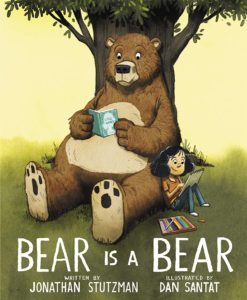 Oh, right. Seventy years ago I was in the eighth grade at Buffalo’s PS 66. One day the school principal, a reserved gentleman whose last name was Webster and whose first name may very well have been George, popped into the classroom and had a few quiet words with the teacher. (Miss Clark? I think it was Miss Clark.) She called us to attention, and Mr. Webster presented a problem:
Oh, right. Seventy years ago I was in the eighth grade at Buffalo’s PS 66. One day the school principal, a reserved gentleman whose last name was Webster and whose first name may very well have been George, popped into the classroom and had a few quiet words with the teacher. (Miss Clark? I think it was Miss Clark.) She called us to attention, and Mr. Webster presented a problem:
“Two men set up camp and went out hunting. They walked one mile due south, then one mile due west. Then they shot a bear. And then they walked one mile due north and found themselves back at camp. So—what color was the bear?”
So?
I figured it out right away, to the evident chagrin of Mr. Webster, who’d supposed his conundrum was right up there with the Gordian Knot and the Riddle of the Sphinx. And I certainly don’t intend to deprive any of y’all of the satisfaction of working it out for yourselves.
Cheers,
July 21, 2021
WRITE FOR YOUR LIFE—now in audio!
This will be brief—for two reasons. First, I’ve only got one piece of information to impart. I think it’s a significant one, but it shouldn’t take all that many words to convey it. Secondly, I’ve got a train to catch; my Frequent Companion and I are actually taking an out-of-town vacation for the first time in a year and a half. We’re going only a couple of hundred miles, and we’ll be gone for only ten days, but in a few hours we’re outta here—and I can’t wait.
So here’s the story. In the early 1980s I developed Write For Your Life, an interactional one‑day seminar for writers, and the aforementioned Frequent Companion and I spent the better part of several years presenting it all over the country. It was enormously satisfying work for us, and it worked wonders for the people who took it, but a few years was plenty and I was glad to pull the plug and get back to full-time writing.
What lived on after the seminar was history was the book version: Write For Your Life: The Home Seminar for Writers. I’d self-published it as a trade paperback in 1986, and it soon sold out and went out-of-print. (This was ages before ebooks or print-on-demand; I had 5000 copies printed, sold them all, and that was that.)
Then technology. The book has been available for a few years now, first as an ebook and more recently in paperback and hardcover editions. It wound up getting a better reception now than it did back in the day, and is regularly to be found among my bestselliing titles.
You very likely know all this, and you probably know as well that I’ve self-published audiobook versions of 40+ of my backlist titles, through Audible’s ACX division.
 But I held off on Write For Your Life—not because I doubted its prospects in audio, but because I felt it was a book that ought to be author-narrated. I’ve provided the narration for several of my books over the years, and WFYL was a logical candidate—but it’s become clear to me that I’ve just plain aged out of the enterprise of voicing an audiobook.
But I held off on Write For Your Life—not because I doubted its prospects in audio, but because I felt it was a book that ought to be author-narrated. I’ve provided the narration for several of my books over the years, and WFYL was a logical candidate—but it’s become clear to me that I’ve just plain aged out of the enterprise of voicing an audiobook.
Really? Don’t they say age is just a number?
Indeed. And when they do, I reply that auto-defenestration is just a suggestion. I’ve done enough narration to know I can no longer perform the task to my own satisfaction. My voice falls apart an hour or two in; even more important, the work demands more undiluted concentration then I have in reserve.
So in recent years I’ve enlisted superb voice artists to stand in for Your Humble Author. Michael Bonner has done so for The Liar’s Bible and The Liar’s Companion, plus my memoir of racewalking, Step By Step. Mike Dennis has voiced Writing the Novel from Plot to Print to Pixel, as well as the novels Borderline, Sinner Man, and The Girl with the Deep Blue Eyes. More recently, Peter Berkrot’s narration of my early-days memoir, A Writer Prepares, has been generating no end of raves.
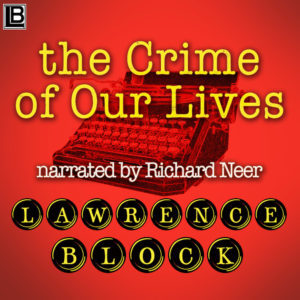 For
Write For Your Life
, I turned to Richard Neer, the accomplished voice artist who stood in for me to great effect in two previous books
—The Crime of Our Lives
, a collection of my observations of crime fiction and the people who write it, and
Spider, Spin Me a Web
, an instructional book for writers of fiction.
For
Write For Your Life
, I turned to Richard Neer, the accomplished voice artist who stood in for me to great effect in two previous books
—The Crime of Our Lives
, a collection of my observations of crime fiction and the people who write it, and
Spider, Spin Me a Web
, an instructional book for writers of fiction.Spoiler Alert: Richard did a superb job with Write For Your Life. It’s available right now at Amazon and Audible.
When I looked for it on Amazon the other day, it said it included the Affirmations For Writers tape. Then I looked again just now, and it no longer said anything about the tape.
I know.
Back when we were offering the seminar, I made a tape of affirmations, designed for repeated listening, and backed by an original music track by Jeremy Wall of Spyro Gyra. I thought we could incorporate it in the new audiobook, but I was mistaken. I’d mentioned the tape in an early version of the audiobook product description, and that turned up in the Amazon and Audible listings until we were able to correct it.
So I can’t get the tape?
You can, but it comes as a separate MP3 download. Buying it couldn’t be much simpler: just remit $10 by PayPal to lawbloc@ gmail.com, and be sure to enter your email address and the words “Affirmations MP3” in the message space PayPal provides. David, my indispensable assistant, will send you the requisite link and easy downloading instructions.
Actually, it’s better to keep them separate. Plenty of people would rather have the printed book—but they still might want to fall asleep listening to the Affirmations tape. And, you know, vice versa.
I’ll take your word for it. Anyway, that’s all I got. And I haven’t quite finished packing, and my train’s not going to catch itself, and…
Cheers,

PS: As always, please feel free to forward this to anyone you think might find it of interest. And, if you yourself have received the newsletter from a friend and would like your own subscription, that’s easily arranged; an email to lawbloc@gmail.com with Newsletter in the subject line will get the job done.
LB’s Blog and Website
LB’s Facebook Page
Twitter: @LawrenceBlock
June 22, 2021
Read LB via Kindle Unlimited—Free!
Over the years, I’ve made much of my work available through Kindle Unlimited. Very simply, this is how it works: Members who subscribe to Amazon’s Kindle Unlimited program have genuinely unlimited access to a vast body of material; while as a member you can only have ten KU titles at a time downloaded to your device, a click is all it takes to return one title and select another—and you can do this as frequently as you wish.
If you’re not already a Kindle Unlimited member, just click here to check it out…
In order for me to make a particular work available on Kindle Unlimited, I have to forego publishing an electronic version on any platform other than Amazon’s Kindle. In return for this exclusivity, the title is included in KU. (While the reader pays nothing to read it, the author does get compensated, earning a fraction of a cent for every page read. That doesn’t sound like much—and, frankly, it’s not. But it’s enough so that readers with a conscience need not feel they are exploiting the authors whose books they read for free.)
Here are the various titles of mine you can read for free via Kindle Unlimited. (I’ll update the list as I add additional titles, so you might want to bookmark this page for future reference.) I’ll also note how and where you can obtain these titles if you’re not a KU subscriber.
KELLER STORIES in chronological order:
Keller’s Fedora (a novella)
Please note: All of the listed Keller stories have appeared as portions of episodic Keller novels; if you have the books (Hit Man, Hit List, Hit Parade, Hit and Run, and Hit Me) you already have the stories. The novella, Keller’s Fedora, is electronically exclusive to Kindle, but is widely available as a hardcover or paperback book.
KIT TOLLIVER STORIES in chronological order:
Please note: Kit Tolliver is the homicidal heroine of Getting Off, and if you’re a KU subscriber you can read her complete adventures for free; if you’re not, you could buy the individual stories for $2.99 apiece—but you’d be much better off buying the Hard Case Crime volume, as either a printed book or an ebook.
MATTHEW SCUDDER SHORT STORIES in chronological order:
Please note: There have been eleven Matthew Scudder short stories, but only these five are accessible through Kindle Unlimited. As an alternative, they’re all collected and widely available in The Night and the Music, along with an appreciation by Brian Koppelman.
MIDCENTURY EROTIC NOVELS in alphabetical order:
Please note: These titles were all originally published in the early 1960s by Nightstand Books, under the pen name “Andrew Shaw.” That whole chapter in my career gets a lot of attention in my memoir, A Writer Prepares. I’ve reissued quite a few others, but only these six are Kindle Unlimited titles at present. To see the others, just search for Lawrence Block Collection of Classic Erotica.
EHRENGRAF STORIES in chronological order:
Please note: These are eleven of the twelve stories which comprise Defender of the Innocent: The Casebook of Martin Ehrengraf. (#11, “The Ehrengraf Settlement,” is unaccountably missing, an oversight I’ll correct when time permits.) Again, these stories are free for the reading with Kindle Unlimited; for nonsubscribers, you’re much better off buying the complete ebook or printed book.
BOOKS BY JOHN WARREN WELLS in no particular order:
Please note: I used the pen name “John Warren Wells” for an extended series of nonfiction works dealing with sexual behavior, much of it presented in the form of case histories and interviews. Several JWW titles are not available via Kindle Unlimited; a search for “Lawrence Block John Warren Wells” should turn them up.
VARIOUS SHORT STORIES in alphabetical order:
As Dark as Christmas Gets (Chip Harrison)
Death of the Mallory Queen (Chip Harrison)
How Far (a one-act play)
Like a Thief in the Night (Bernie Rhodenbarr)
Nothing Short of Highway Robbery
Resume Speed (a novella)
Please Note: These stories, and many more as well, can be found in the several collections of my short fiction: Enough Rope, Catch and Release, One Night Stands and Lost Weekends, and Resume Speed and Other Stories. I may make additional stories KU-available; if and when I do, I’ll add them to this list.
SUMMING UP: If you’re already a Kindle Unlimited subscriber, you know how it works—and now you know what titles of mine are available to you under that program. Have at it, and I hope you find something you can read with pleasure.
If you have a Kindle but haven’t taken advantage of Kindle Unlimited, you might want to check it out. There’s a huge library of free reading out there for you, and if reading’s a substantial part of your life, you come out way ahead.
If you don’t have a Kindle, and really don’t want to buy one, you can still join Kindle Unlimited and enjoy all its benefits. Just download a free Kindle app and you can read any Kindle ebooks on just about any device—your phone, your pad, your computer, your pop-up toaster, your microwave oven…
Well, maybe not the toaster or the microwave. Not yet, but who’s to say what the future holds?

June 12, 2021
JILL EMERSON GETS A MAKEOVER
Really? Our Jill?
Well, not Jill herself, who’s the same radiant polyamorous creature she was when she first began writing novels on my typewriter some 55 years ago. There have been nine books over the years, published variously by Fawcett, Midwood, Berkley, Putnam, Arbor House, and, most recently, Hard Case Crime.
The ninth book, Getting Off, is still in print and ebook with Hard Case—and in audio at Recorded Books. The rights of the other eight reverted to me, and a few years ago I republished them in uniform covers with a strong assertion of authorship: “Lawrence Block is Jill Emerson.”
That served to brand the books reasonably well, but lately I’d come to realize I just wasn’t all that crazy about the covers. The common design made them look too much of a piece, and the books don’t actually run to type. (Our Jill has always been, in more ways than one, a Versatile Lady.)
So, as the indispensable JWM and I have been working up new covers, we were incentivized by a new development at KDP, Amazon’s division for self-publishers. They’ve made it possible for me to offer hardcover editions of the books I publish. (These are  of the sort generally known as Library Bindings, although the printing trade is more apt to designate them as Case Laminated. Whatever you call them, they’re hardbound books produced without removable paper dust jackets; the cover art and copy that would appear on a dust jacket is printed directly on the book’s hard cover.)
of the sort generally known as Library Bindings, although the printing trade is more apt to designate them as Case Laminated. Whatever you call them, they’re hardbound books produced without removable paper dust jackets; the cover art and copy that would appear on a dust jacket is printed directly on the book’s hard cover.)
Just to see how it would work, we began with a hardcover edition of Godimento, Annalisa Passoni’s fine Italian translation of Getting Off. The result was an exceptionally attractive and durable volume, and it immediately inspired me to make all the newly-packaged Jill Emerson titles available not only as ebooks and paperbacks but in hardcover editions as well.
I bet you’re going to show us the covers. And while you’re at it, you’ll find something to tell us about each of the titles.
You know me so well.
The first book, Shadows, is the story of a young woman who graduates from a Midwestern college and comes to New York’s Greenwich Village to discover her sexual identity. She finds an affordable apartment right away and spends the next fifty 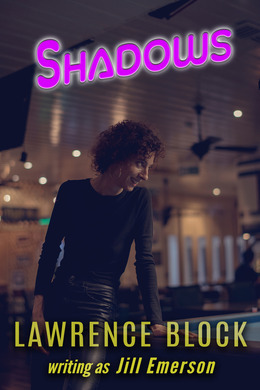 thousand words figuring out whether she’s gay or straight; nowadays, I have to say, it’d be more realistic to reverse the two timelines.
thousand words figuring out whether she’s gay or straight; nowadays, I have to say, it’d be more realistic to reverse the two timelines.
Shadows has actually been around longer than Jill; it’s the first novel I ever wrote, and came out in 1959 under Fawcett’s Crest Books imprint, then the premier publisher of lesbian fiction. It bore a different title and a different pen name, and it had its beginnings in a burst of creativity that accompanied an absolutely insupportable hangover; all of this is related on the book’s Amazon page and discussed in greater detail in my forthcoming memoir, A Writer Prepares. When I first considered reprinting the book, I decided to revert to the title I’d placed on the manuscript originally, and realized too that it was very much a Jill Emerson book, whether or not she’d been around at the time of its creation.
Shadows was the name I had given to the lesbian bar where many of the book’s scenes are set—I had in mind the old Swing Rendezvous on MacDougal Street, which none of y’all are old enough to remember—so it seems appropriate that the title on the new cover resembles a neon sign. As noted, the novel is available as Ebook and Paperback and Hardcover, and gets an excellent Audio rendition from voice artist P J Morgan.
It was in 1964 that Jill sat down at my typewriter in a second-floor office at the corner of Brighton and Eggert Roads, in Tonawanda, New York. What came out of that typewriter was a novel that I called Shadows and Twilight—I guess I really wanted to see the  word Shadows on a book cover—and dispatched as an over-the-transom submission to John J. Plunkett at Midwood Tower Books. Now I’d been one of Midwood’s original writers, that’s where Sheldon Lord got his start, and why I submitted the way I did instead of approaching Midwood directly qualifies as a Damned Good Question, and one I examine unsparingly in A Writer Prepares.
word Shadows on a book cover—and dispatched as an over-the-transom submission to John J. Plunkett at Midwood Tower Books. Now I’d been one of Midwood’s original writers, that’s where Sheldon Lord got his start, and why I submitted the way I did instead of approaching Midwood directly qualifies as a Damned Good Question, and one I examine unsparingly in A Writer Prepares.
And any embarrassment I might feel over the numbing gormlessness of my approach is, I blush to admit, offset by pride over the fact that it worked. John Plunkett bought the book by return mail, and I never even considered objecting when he retitled it Warm and Willing. (And you’ll note that he changed only two words of my title. He kept the and.)
Warm and Willing is available as Ebook and Paperback and Hardcover—and also in Audio, voiced by Emily Beresford.
Plunkett was happy to publish Jill’s next effort, Enough of Sorrow, the title of which comes from a poem by Mary Carolyn Davies. The book, like its predecessor, is lesbian romance; it is also accurate to call it a coming-of-age novel.
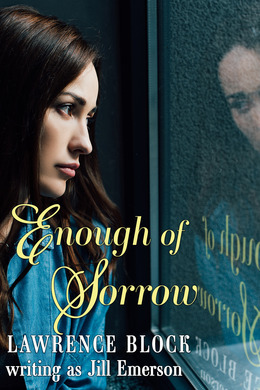 Midwood’s original paperback cover proclaimed the book to be the winner of the 1965 Midwood Award for Literary Excellence. Make of that what you will; the award, as far as I can make out, was given only once. I can’t pretend that it’s up there with the Nobel and the Pulitzer, but I think it’s safe to say it suggests that the folks at Midwood regarded Enough of Sorrow as a cut above the general run of similar books. I’d had that feeling myself while I was writing it, and you’d think Jill would have followed it with several more books for Midwood, setting the literary bar a little higher with each venture.
Midwood’s original paperback cover proclaimed the book to be the winner of the 1965 Midwood Award for Literary Excellence. Make of that what you will; the award, as far as I can make out, was given only once. I can’t pretend that it’s up there with the Nobel and the Pulitzer, but I think it’s safe to say it suggests that the folks at Midwood regarded Enough of Sorrow as a cut above the general run of similar books. I’d had that feeling myself while I was writing it, and you’d think Jill would have followed it with several more books for Midwood, setting the literary bar a little higher with each venture.
Wrong. Jill never wrote another book for Midwood, and I’d be hard put to tell you why. Never mind; the book’s available as Ebook – Paperback – Hardcover The Audio is impeccably voiced by Emily Beresford.
Jill’s Middle Period came a few years later, a little too late to receive attention in A Writer Prepares, which ends with the first Evan Tanner adventure in 1966. It consisted of three books, all Berkley paperback originals —Thirty and Threesome, both published in 1970, and 1972’s A Madwoman’s Diary. All of them owe their existence to two phenomena of the day, one societal and one personal.
First, the societal development. During the mid-1960s, erotic realism surged in contemporary American fiction. Literary novels with a frankness of vocabulary and explicit sexual candor were all at once being produced by respected authors and published by top houses. Just a few years earlier, Sheldon Lord and Andrew Shaw had written dozens of erotic novels without ever describing genitalia or using any of the words George Carlin famously identified as those you couldn’t say on TV.
Suddenly, one could write realistically about sex. Who knew?
Meanwhile, I was going through some significant inner turmoil as far as my own feelings about fiction were concerned. I was reading as much as ever, but the basic premise of the novel seemed unreal and artificial to me. Whether the narration was first- or third-person, whose was this voice in my ear, telling me this story? What were these words doing on these pages?
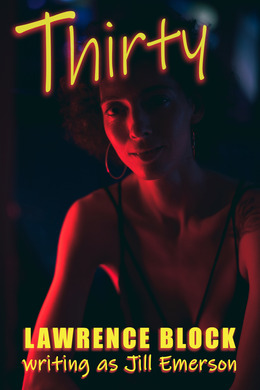 It seemed to me that a novel ought to have something in common with a trompe l’oeil painting—i.e., it ought to appear to be the thing itself. A diary, say, or a collection of letters, something that could legitimately exist as a vehicle for verisimilitude.
It seemed to me that a novel ought to have something in common with a trompe l’oeil painting—i.e., it ought to appear to be the thing itself. A diary, say, or a collection of letters, something that could legitimately exist as a vehicle for verisimilitude.
Thirty stemmed from my observation that a thirtieth birthday constituted a pivotal event for a lot of women. The book took the form of a diary of one such woman, and I was as intent on giving it the attributes of a genuine diary—gaps, false starts, evasions—as I was on telling a story. Berkley was well pleased with the book, but some dimwit there retitled it I Am Curious—Thirty in order to echo I Am Curious—Yellow, a 1967 Swedish film which the world has largely forgotten, as well it might. I restored my original title when I republished the book. Ebook Paperback Hardcover Once again, the Audio is the good work of Emily Beresford.
Threesome owed its conception to Naked Came the Stranger, a collaborative venture of two dozen writers, most of them  journalists; inspired by that book’s success, the titular trio of Harry, Rhoda, and Pru decide to create a bestseller of their own, telling their own actual story in alternating chapters. And, alas, as each reads the previous chapters, their ongoing story changes, and Unanticipated Things Happen.
journalists; inspired by that book’s success, the titular trio of Harry, Rhoda, and Pru decide to create a bestseller of their own, telling their own actual story in alternating chapters. And, alas, as each reads the previous chapters, their ongoing story changes, and Unanticipated Things Happen.
I loved writing this one. It was a challenge to move from one voice to another, and the whole book was as much tour de force as trompe l’oeil. (And that, along with pommes de terre, pretty much exhausts my command of French.) I thought of the book that immediately preceded it, moved the decimal point one degree to the left, and called it Three. Berkley called it Threesome, and when I republished the book I decided to let the new title stand.
Since the novel is told in three distinct narrative voices, one male and two female, the Threesome audiobook called for more than a single narrator. Bill Weeden and Dolores McDougal rose to the challenge, and the result is a treat. Ebook – Paperback – Hardcover – Audio
A Madwoman’s Diary is, as the title might lead you to suspect, a second venture in diary form. The protagonist is very different, 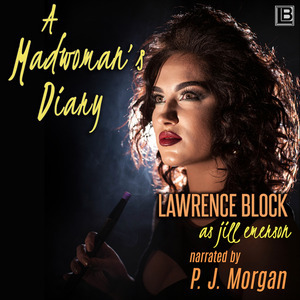 however, from the diarist of Thirty, and the storyline itself had an interesting origin; in one of the sex-fact compilations I wrote as John Warren Wells, an individual case history I’d fabricated lingered in my mind after I’d finished the book. It struck me that it had all the requisite ingredients of a novel, and I figured I could appropriate it for that purpose without having to worry that I might sue myself for plagiarism. (And Jill was in fact courteous enough to dedicate the book to JWW.) Ahem. Berkley, latching onto the recent success of The Sensuous Woman, called the book Sensuous. I suppose I was lucky they didn’t call it I Am Sensuous—Yellow. When I got the chance, I changed it back.
however, from the diarist of Thirty, and the storyline itself had an interesting origin; in one of the sex-fact compilations I wrote as John Warren Wells, an individual case history I’d fabricated lingered in my mind after I’d finished the book. It struck me that it had all the requisite ingredients of a novel, and I figured I could appropriate it for that purpose without having to worry that I might sue myself for plagiarism. (And Jill was in fact courteous enough to dedicate the book to JWW.) Ahem. Berkley, latching onto the recent success of The Sensuous Woman, called the book Sensuous. I suppose I was lucky they didn’t call it I Am Sensuous—Yellow. When I got the chance, I changed it back.
Ebook – Paperback – Hardcover. . .and Audio, of course, sensitively rendered by P J Morgan.
What would have been Jill Emerson’s fourth trompe l’oeil novel for Berkley was epistolary, consisting of the letters to and from its protagonist, the wily and impetuous Laurence Clarke. Instead my agent submitted Ronald Rabbit is a Dirty Old Man to Bernard Geis, who published it as a hardcover novel by Lawrence Block even as he was extending his own autobiography all the way to, um, Chapter Eleven. I could say more about Ronald Rabbit, but…
But you’re telling us about Jill Emerson.
I am, and the final three books don’t really constitute a group. They’re three very different novels, and the only common denominator is the Jill Emerson name and its attendant sensibility. I’m very fond of all three, but then I’m all too apt to smack my lips over my own cooking. No devotee of Baal was ever more inclined to bow down to the work of his own hands.
Jill’s seventh book, The Trouble With Eden, was her own first hardcover, a big multiple-viewpoint book set in Bucks County, 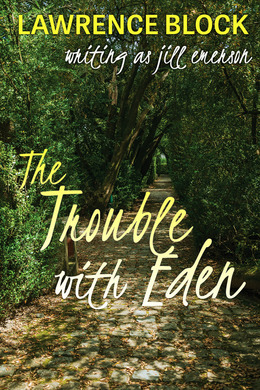 Pennsylvania. At the time I lived on the New Jersey side of the Delaware, just outside of Lambertville, and was for a year the hapless proprietor of an art gallery in New Hope. Berkley wanted Jill to write something that might remind readers of Peyton Place, so I picked Bucks County as a setting.
Pennsylvania. At the time I lived on the New Jersey side of the Delaware, just outside of Lambertville, and was for a year the hapless proprietor of an art gallery in New Hope. Berkley wanted Jill to write something that might remind readers of Peyton Place, so I picked Bucks County as a setting.
I remembered Berkley’s fondness for titles that called other titles to mind. Indeed, how could I forget? And I was well aware that Edmund Schiddel had managed to sell a ton of books in 1959 while scandalizing a slew of Pennsylvanians with The Devil in Bucks County. So I ran The Trouble With Bucks County up the flagpole and waited confidently for everybody to salute. Instead they went with The Trouble With Eden. You know what? I like their title better, and have elected to keep it. Ebook – Paperback – Hardcover
A Week as Andrea Benstock owes its existence to an editor at Dell Books and its form to a Belgian novelist. Peggy Roth 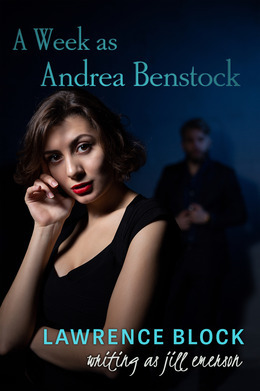 persuaded me that I ought to find a novel in my having grown up Jewish in Buffalo, New York; Georges Simenon’s early novel, Four Days in a Lifetime, gave me the idea of recounting the story of a woman’s married life by spotlighting seven representative days over a period of ten years.
persuaded me that I ought to find a novel in my having grown up Jewish in Buffalo, New York; Georges Simenon’s early novel, Four Days in a Lifetime, gave me the idea of recounting the story of a woman’s married life by spotlighting seven representative days over a period of ten years.
My agent submitted it to Don Fine, founder and proprietor of Arbor House. A meeting was arranged, and Don was astonished when I turned up as Jill. He urged me more than once to publish the book under my own name, arguing that the book would be taken more seriously with a man’s name on it. I stuck to my guns, though I’d be hard put now to explain why, and the book was published in 1975 and serialized in Redbook. Ebook – Paperback – Hardcover
Finally, Getting Off began with a single short story about a young woman who lets herself be picked up and taken home by a guy with a menacing vibe to him. She turns out to be the 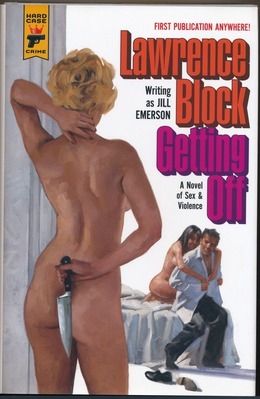 dangerous one, and proves it by murdering the fellow and rifling his wallet. Another story followed, and another, and by the fourth it was apparent to me that, as with Keller and Hit Man, I was writing a novel on the installment plan.
dangerous one, and proves it by murdering the fellow and rifling his wallet. Another story followed, and another, and by the fourth it was apparent to me that, as with Keller and Hit Man, I was writing a novel on the installment plan.
It’s a right wonder of a book, sexually explicit and unapologetically violent, and there was no reason to hang Jill’s name on it and every reason not to—but it just felt right to me to give Jill the byline. I did so via an open pen name—“by Lawrence Block writing as Jill Emerson”—and Charles Ardai published it as Hard Case Crime’s first hardcover title.
I added the subtitle “A Novel of Sex and Violence,” and wouldn’t you know it? Some ninny on Amazon gave it a one-star review because he objected to the sex and violence. Never mind. It’s still an active title for Hard Case, so I couldn’t give it a new cover if I wanted to, but why on earth would I want to replace the stunning Greg Manchess cover?
You may be crazy but you’re not stupid.
Exactly. Hard Case offers Ebook – Paperback – Hardcover editions, and Recorded Books can supply Lily Bask’s stellar Audio rendition, and—
Audio!
 What about it?
What about it?
That’s what I was about to ask. What about audio for The Trouble With Eden and A Week as Andrea Benstock?
Even as we speak, Barbara Nevins Taylor is lending her voice to A Week as Andrea Benstock. Her audiobooks of A Woman Must Love and Of Shame and Joy have been very well received, and I can’t wait to hear what she does with Andrea.
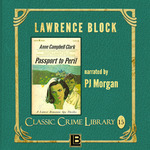 Well, that’s good news. But what about The Trouble With Eden? How did it get to be the red-haired stepchild of the Jill Emerson oeuvre?
Well, that’s good news. But what about The Trouble With Eden? How did it get to be the red-haired stepchild of the Jill Emerson oeuvre?
Oeuvre, eh? Well, pommes de terre to you, mon vieux. Anyway, it’s no such thing, and an audiobook thereof will be along in due course. The reason Eden is on the shelf for the moment is because everybody’s busy. PJ, who did such a fine job with Passport to Peril, has just signed on for the first-ever audio version of the 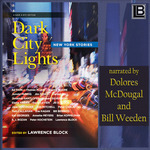 classic Campus Tramp. Bill and Dolores, whose recent work includes 3 is Not a Crowd and Dark City Lights, have teamed up again for Circle of Sinners.
classic Campus Tramp. Bill and Dolores, whose recent work includes 3 is Not a Crowd and Dark City Lights, have teamed up again for Circle of Sinners.
I’m beginning to get the picture.
Well, don’t blink, because there’s more. Theo Holland, who followed the Evan Tanner series with a title from my Classic Crime Library, Broadway Can Be Murder, is staying busy with A Girl Called Honey. And Peter Berkrot, who’s done 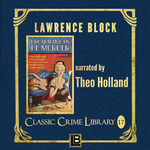 marvelous work with several books of mine, most recently The Darkling Halls of Ivy, has completed recording A Writer Prepares for Tantor Audio; you can preorder it now, and you’ll be able to listen to it on the book’s publication date of June 24.
marvelous work with several books of mine, most recently The Darkling Halls of Ivy, has completed recording A Writer Prepares for Tantor Audio; you can preorder it now, and you’ll be able to listen to it on the book’s publication date of June 24.
That’s not that far away.
I know! It was well in the future when I started work on this endless newsletter, but time takes time, and Publication Day is less than two weeks away. So it’s probably appropriate to remind 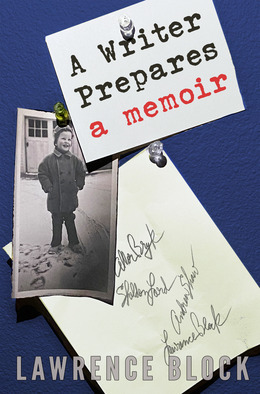 you that you’ll save $3 when you preorder the ebook for $6.99. You can also preorder the paperback and hardcover—and SST Publications still have a very few copies remaining of their deluxe signed-and-numbered limited edition.
you that you’ll save $3 when you preorder the ebook for $6.99. You can also preorder the paperback and hardcover—and SST Publications still have a very few copies remaining of their deluxe signed-and-numbered limited edition.
Alex Kourvo’s thing is reviewing books for writers. Why don’t you tell us what she said about A Writer Prepares?
Well. . .
Oh, come on. You know you want to.
Oh, okay. “A Writer Prepares is incredibly smooth reading, written in Block’s conversational style. It’s also funny. I kept stopping to read parts of it out loud to my family, because they wanted to know why I was giggling my way through a memoir. Block puts a light spin on everything, reminding us that writing truly is the best job in the world. Reading a writer’s memoir is always inspirational, but A Writer Prepares is both inspiring and instructive. It’s a delightful look back in time filled with lessons for the present day.”
Whew, there you go. So how’s that for a way to make a long story longer?
Cheers,







